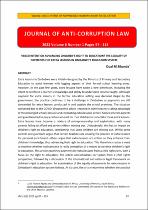| dc.contributor.author | Sibanda, Opal M | |
| dc.date.accessioned | 2022-10-25T12:22:19Z | |
| dc.date.available | 2022-10-25T12:22:19Z | |
| dc.date.issued | 2022 | |
| dc.identifier.citation | Sibanda, O. M. (2022). Veiled intent or advancing children’s right to education? The legality of payments for extra lessons in Zimbabwe’s education system. Journal of Anti-Corruption Law, 6(1), 97 – 115. | en_US |
| dc.identifier.issn | 2521-5345 | |
| dc.identifier.uri | http://hdl.handle.net/10566/8078 | |
| dc.description.abstract | Extra lessons in Zimbabwe were initially designed by the Ministry of Primary and Secondary Education to assist learners with lagging aspects of their formal school learning areas. However, in the past few years, extra lessons have taken a new dimension, including the intent to reinforce a learner’s knowledge and ability to understand lessons taught. Although payment for extra lessons in the formal education setting was declared illegal by the government, the practice continues to be a challenge in Zimbabwe as payments are still demanded for extra lessons conducted in and outside the school premises. | en_US |
| dc.language.iso | en | en_US |
| dc.publisher | University of the Western Cape | en_US |
| dc.subject | Children's rights | en_US |
| dc.subject | Education | en_US |
| dc.subject | Secondary Education | en_US |
| dc.subject | Covid-19 | en_US |
| dc.subject | Public health | en_US |
| dc.subject | Zimbabwe | en_US |
| dc.title | Veiled intent or advancing children’s right to education? The legality of payments for extra lessons in Zimbabwe’s education system | en_US |
| dc.type | Article | en_US |

